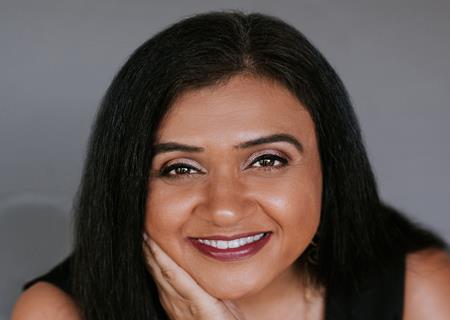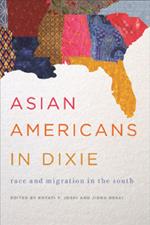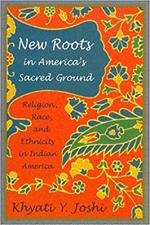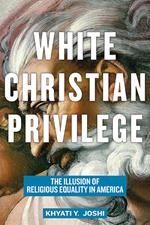
14 Jan Dr. Khyati Joshi

Speaker: DR KHYATI JOSHI
Co-founder, Institute for Teaching Diversity & Social Justice, thought leader on the intersecting issues of race, religion and immigration
Speech Topics Include:
Where We’ve Come From and Where We’re Going: Race, Immigration, & Citizenship in the U.S.
White Christian Privilege: The Illusion of Religious Equality in America
Building a More Perfect Union: Race and Religion in America
Want to Understand Immigration Today? Start with the History You Didn’t Learn in School
#COVID-19 and Anti-Asian Prejudice
Asian American History is U. S. History
Asian Americans in the South: Revealing our Hidden Histories and Invisible Identities
Getting Comfortable With Being Uncomfortable
Dr. Khyati Y. Joshi is a scholar and thought leader on the intersecting issues of race, religion and immigration in the United States. Her writings, speeches, and course work focus on promoting cultural and religious pluralism in the United States.
Through her workshops and consulting, Dr. Joshi engages educators, policy-makers, and community leaders in an examination of the historical and systemic nature of bias, its consequences in everyday life, and the solutions that foster social justice and inclusiveness. In doing so, she provides clients with the tools to enhance both their own and their organizations’ ability to provide inclusive, meaningful services and experiences in an increasingly connected and diverse world.
Professor Joshi’s research and scholarly work taps the experiences of South Asian Americans and other immigrant communities to illuminate race relations and inform interfaith work in the United States. She is an author, editor, and contributor to numerous ground-breaking books and journals in her field.
Where We’ve Come From and Where We’re Going: Race, Immigration, & Citizenship in the U.S.
The presentation provides a glimpse into strands of lesser-known history that have shaped this nation, illuminating the role of race in U.S. history. Specifically, audience members will be presented with a narrative that shows how Supreme Court decisions, immigration laws and Jim Crow policies contributed to the development of Whiteness in America and how these historical moments continue to shape our nation.
White Christian Privilege: The Illusion of Religious Equality in America
Christianity’s overwhelming social power shapes America today, even when religious discrimination is mistaken for racism or obscured in debates over immigration or national identity. Dr. Joshi presents the ways in which Christian privilege is embedded in U.S. policy, politics, and society’s rules and assumptions about who belongs and who doesn’t. Using data as well as personal stories Khyati Y. Joshi maps the origins of Christian privilege and the entwinement of Christianity and Whiteness in American national identity. She traces these phenomena from their European orientalist roots, to the American colonial era and Westward expansion, through 19th-century immigration and citizenship policies, to present-day social movements. Using the voices of Christians and religious minorities, Joshi explores the effects of Christian privilege and White racial norms on how all sorts of Americans live religion in the present day. In doing so, she poses and begins to answer the most urgent question Americans may face today: How to become a “more perfect union” – a religiously pluralistic democracy that leaves White Christian supremacy behind.
Building a More Perfect Union: Race and Religion in America
Race and Religion are central organizing principles of life in America, where we often promote the ideas of cultural and religious pluralism and simultaneously assert that we are a Christian nation. This presentation provides a short historical overview of the development of a White Christian Norm that is part of everyday America. The presentation then moves on to focus on the religious diversity in the US, with an emphasis on the lived experience of groups who are both religious and racial minorities.
Want to Understand Immigration Today? Start with the History You Didn’t Learn in School
Understanding the immigration debate today, means revisiting information from US History that most of us didn’t learn in school. This presentation provides explanations of key historical moments that illuminate points of the immigration debate of the past 20 years. Using anecdotes, Dr. Joshi explains the impacts of the laws on US society, including immigrant communities.
#COVID-19 and Anti-Asian Prejudice
This presentation offers the latest statistics on the number and type of anti-Asian incidents across the United States related to the COVID-19 coronavirus pandemic, a global viral outbreak that has been demagogued with racist terms like “Chinese virus,” “Wuhan virus,” and “Kung Flu.” Prof. Joshi will contextualize this anti-Asian racism in U.S. history, showing how Chinese immigrants in particular have been seen as unclean and discrepant foreigners. She offers strategies for being an ally in combatting and interrupting anti-Asian prejudice in your community.
Asian American History is U. S. History
Often thought of as “forever foreigners,” Asian Americans in fact played key roles at pivotal moments in U.S. history. Asian American stories illuminate the history of inclusion and exclusion in America on issues like civil rights, immigration, and controversies over bilingual education. Providing information often ignored in mainstream U.S. history texts, this is an ideal presentation for Asian Pacific American History Month.
Asian Americans in the South: Revealing our Hidden Histories and Invisible Identities
This presentation begins with a history of Asian Americans in the South, from Filipinos and Bengali Muslims in Louisiana, to Chinese in Mississippi, to Indian hoteliers, Cambodian refugees, and others. It continues in the present day, exploring race and racism as Asian Americans experience them. Asian Americans suffer invisible identities, confront stereotypes and face discrimination in the workplace and education that may not be recognized in places where the Black-White racial paradigm is so deep in the culture.
Getting Comfortable With Being Uncomfortable
Knowledge and Skills are required to advance towards social justice. Learning about Social Justice issues and taking action isn’t always conformable. Becoming aware of our own biases, and gaps of information can be uncomfortable. In this presentation, Dr. Joshi talks about a process to help individuals get comfortable with being uncomfortable.










